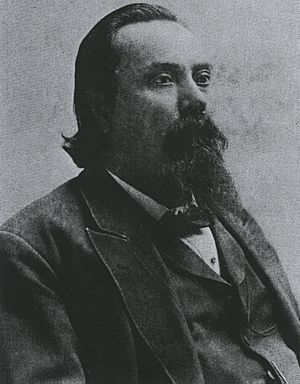George W. Harkins facts for kids
Quick facts for kids
George W. Harkins
|
|
|---|---|

between 1860s-1880s
|
|
| Born | 1810 |
| Died | October 23, 1861 (aged 50–51) |
| Nationality | Choctaw |
| Education | Cumberland University, Law |
| Occupation | Statesman, tribal chief |
| Predecessor | Greenwood LeFlore |
George Washington Harkins (1810–1861) was an important leader of the Choctaw people. He was a lawyer and a tribal chief during a difficult time called the Indian removal. He became a principal chief after his uncle, Greenwood LeFlore, was removed from his position. Harkins also served as a judge and a district chief in the Indian Territory.
Early Life and Learning
George W. Harkins was born in 1810. His mother, Louisa "Lusony" LeFlore, belonged to a high-ranking Choctaw family. His father was Willis J. Harkins.
In the Choctaw culture, a boy's oldest maternal uncle was a very important teacher. For George, this was Greenwood LeFlore, who was also a Choctaw chief. George learned from both his Choctaw and American cultures. But he always felt most connected to his Choctaw heritage.
Harkins went to Centre College in Kentucky. He later studied law at Cumberland University. This helped him become a skilled lawyer.
Family Life
George Harkins married Salina Gardner and Lily Folsom. Lily was the daughter of Chief David Folsom.
He had several children who grew up to be adults. These included Richard, Sarah, Catherine, Ellen, David, Susan, Cornelia, Henry, Loren, and Mary Jane. In the Choctaw system, children belonged to their mother's family group, called a clan. This helped them gain status within the tribe.
His Work as a Leader
In October 1830, the Choctaw national council removed Greenwood LeFlore as chief. This happened after he signed a treaty for the Choctaw people to be moved from their lands. The council then chose George Harkins to be chief. He was chosen because he was LeFlore's nephew through his mother. In the Choctaw system, the mother's family was very important for a person's standing.
However, the US President, Andrew Jackson, did not accept Harkins as the tribe's leader. This made the difficult process of Indian Removal even harder.
After the Choctaw people were moved, Harkins became more influential. In 1834, he was chosen as a judge for the Red River District in the new Indian Territory. Later, from 1850 to 1857, he was elected as the principal chief of the Apukshunnubbee District. This was one of three main areas in the Choctaw Nation.
These districts showed the old ways the tribe was divided. Over time, in the Indian Territory, these divisions became less important.
Important Letter
In 1831, Harkins wrote a famous letter called "Farewell Letter to the American People". In this letter, he spoke out against the forced removal of the Choctaw people. This letter was printed in many American newspapers. Today, it is still seen as one of the most important writings in Native American history.
In his letter, Harkins explained the hard choice the Choctaw faced. He wrote that they chose to suffer and be free, rather than live under laws they had no say in. He also said that while Americans fought for their freedom, the Choctaw were born free. But they had to "buy" their freedom from the US government, like slaves buying their freedom.
His words showed the deep sadness and unfairness of the Indian Removal. He hoped that future generations would not face such difficult times.
"It is with considerable diffidence that I attempt to address the American people, knowing and feeling sensibly my incompetency; and believing that your highly and well improved minds would not be well entertained by the address of a Choctaw.... We were hedged in by two evils, and we chose that which we thought the least. Yet we could not recognize the right that the state of Mississippi had assumed, to legislate for us. Although the legislature of the state were qualified to make laws for their own citizens, that did not qualify them to become law makers to a people that were so dissimilar in manners and customs as the Choctaws are to the Mississippians. Admitting that they understood the people, could they remove that mountain of prejudice that has ever obstructed the streams of justice, and prevent their salutary influence from reaching my devoted countrymen. We as Choctaws rather chose to suffer and be free, than live under the degrading influence of laws, which our voice could not be heard in their formation.
Much as the state of Mississippi has wronged us, I cannot find in my heart any other sentiment than an ardent wish for her prosperity and happiness.
I could cheerfully hope, that those of another age and generation may not feel the effects of those oppressive measures that have been so illiberally dealt out to us; and that peace and happiness may be their reward. Amid the gloom and horrors of the present separation, we are cheered with a hope that ere long we shall reach our destined land, and that nothing short of the basest acts of treachery will ever be able to wrest it from us, and that we may live free. Although your ancestors won freedom on the field of danger and glory, our ancestors owned it as their birthright, and we have had to purchase it from you as the vilest slaves buy their freedom."
See also
 | Bayard Rustin |
 | Jeannette Carter |
 | Jeremiah A. Brown |

